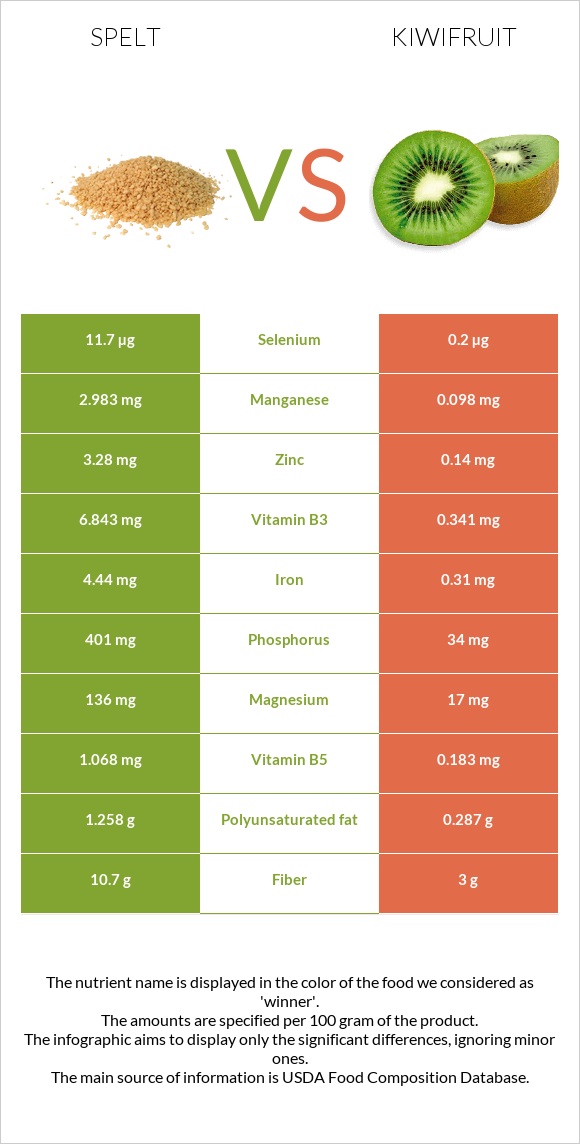Spelt vs. Kiwi — In-Depth Nutrition Comparison
Compare
How are spelt and kiwi different?
- Spelt is richer in manganese, phosphorus, iron, copper, vitamin B3, fiber, zinc, and magnesium, while kiwi is higher in vitamin C and vitamin K.
- Spelt covers your daily need for manganese, 125% more than kiwi.
- Spelt contains 23 times more zinc than kiwi. Spelt contains 3.28mg of zinc, while kiwi contains 0.14mg.
Spelt, uncooked and Kiwifruit, green, raw types were used in this article.
Infographic

Infographic link
Mineral Comparison
Mineral comparison score is based on the number of minerals by which one or the other food is richer. The "coverage" charts below show how much of the daily needs can be covered by 300 grams of the food.
| Contains more MagnesiumMagnesium | +700% |
| Contains more PotassiumPotassium | +24.4% |
| Contains more IronIron | +1332.3% |
| Contains more CopperCopper | +293.1% |
| Contains more ZincZinc | +2242.9% |
| Contains more PhosphorusPhosphorus | +1079.4% |
| Contains more ManganeseManganese | +2943.9% |
| Contains more SeleniumSelenium | +5750% |
| Contains more CalciumCalcium | +25.9% |
| Contains less SodiumSodium | -62.5% |
Vitamin Comparison
Vitamin comparison score is based on the number of vitamins by which one or the other food is richer. The "coverage" charts below show how much of the daily needs can be covered by 300 grams of the food.
| Contains more Vitamin B1Vitamin B1 | +1248.1% |
| Contains more Vitamin B2Vitamin B2 | +352% |
| Contains more Vitamin B3Vitamin B3 | +1906.7% |
| Contains more Vitamin B5Vitamin B5 | +483.6% |
| Contains more Vitamin B6Vitamin B6 | +265.1% |
| Contains more FolateFolate | +80% |
| Contains more Vitamin CVitamin C | +∞% |
| Contains more Vitamin AVitamin A | +∞% |
| Contains more Vitamin EVitamin E | +84.8% |
| Contains more Vitamin KVitamin K | +1019.4% |
All nutrients comparison - raw data values
| Nutrient |  |
 |
DV% diff. |
| Manganese | 2.983mg | 0.098mg | 125% |
| Vitamin C | 0mg | 92.7mg | 103% |
| Iron | 4.44mg | 0.31mg | 52% |
| Phosphorus | 401mg | 34mg | 52% |
| Copper | 0.511mg | 0.13mg | 42% |
| Vitamin B3 | 6.843mg | 0.341mg | 41% |
| Fiber | 10.7g | 3g | 31% |
| Vitamin K | 3.6µg | 40.3µg | 31% |
| Zinc | 3.28mg | 0.14mg | 29% |
| Magnesium | 136mg | 17mg | 28% |
| Vitamin B1 | 0.364mg | 0.027mg | 28% |
| Protein | 14.57g | 1.14g | 27% |
| Starch | 53.92g | 0g | 22% |
| Selenium | 11.7µg | 0.2µg | 21% |
| Carbs | 70.19g | 14.66g | 19% |
| Vitamin B5 | 1.068mg | 0.183mg | 18% |
| Calories | 338kcal | 61kcal | 14% |
| Vitamin B6 | 0.23mg | 0.063mg | 13% |
| Vitamin B2 | 0.113mg | 0.025mg | 7% |
| Polyunsaturated fat | 1.258g | 0.287g | 6% |
| Folate | 45µg | 25µg | 5% |
| Fructose | 0.24g | 4.35g | 5% |
| Vitamin E | 0.79mg | 1.46mg | 4% |
| Fats | 2.43g | 0.52g | 3% |
| Potassium | 388mg | 312mg | 2% |
| Saturated fat | 0.406g | 0.029g | 2% |
| Calcium | 27mg | 34mg | 1% |
| Choline | 7.8mg | 1% | |
| Monounsaturated fat | 0.445g | 0.047g | 1% |
| Net carbs | 59.49g | 11.66g | N/A |
| Sugar | 6.82g | 8.99g | N/A |
| Sodium | 8mg | 3mg | 0% |
| Vitamin A | 0µg | 4µg | 0% |
| Tryptophan | 0.132mg | 0.015mg | 0% |
| Threonine | 0.443mg | 0.047mg | 0% |
| Isoleucine | 0.552mg | 0.051mg | 0% |
| Leucine | 1.07mg | 0.066mg | 0% |
| Lysine | 0.409mg | 0.061mg | 0% |
| Methionine | 0.258mg | 0.024mg | 0% |
| Phenylalanine | 0.737mg | 0.044mg | 0% |
| Valine | 0.681mg | 0.057mg | 0% |
| Histidine | 0.36mg | 0.027mg | 0% |
| Omega-3 - ALA | 0.065g | N/A |
Macronutrient Comparison
Macronutrient breakdown side-by-side comparison
| Contains more ProteinProtein | +1178.1% |
| Contains more FatsFats | +367.3% |
| Contains more CarbsCarbs | +378.8% |
| Contains more OtherOther | +193.4% |
| Contains more WaterWater | +653.8% |
Fat Type Comparison
Fat type breakdown side-by-side comparison
| Contains more Mono. FatMonounsaturated fat | +846.8% |
| Contains more Poly. FatPolyunsaturated fat | +338.3% |
| Contains less Sat. FatSaturated fat | -92.9% |
Carbohydrate type comparison
Carbohydrate type breakdown side-by-side comparison
| Contains more StarchStarch | +∞% |
| Contains more SucroseSucrose | +293.3% |
| Contains more MaltoseMaltose | +2610.5% |
| Contains more GlucoseGlucose | +389.3% |
| Contains more FructoseFructose | +1712.5% |
| Contains more GalactoseGalactose | +∞% |
~equal in
Lactose
~0g